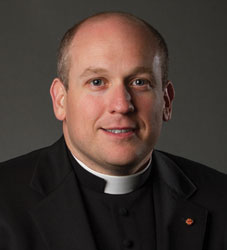 This year’s liturgical reading cycle focuses on Matthew’s Gospel, thus the Passion Narrative that is presented to us this Palm Sunday. Matthew, like Luke, relies heavily on Mark’s Gospel. Luke’s Passion Narrative, however, has a different feel than Mark’s narrative. Luke’s narrative shows us a Jesus who ministers to those around Him to the very end; as grim as the narrative is, it is immersed with compassion and light. That is not the same feeling that is elicited from Matthew’s Passion Narrative. Like Mark’s narrative, from which Matthew greatly draws, Matthew’s narrative is dark with a sense of swirling and impending doom around Jesus. Towards the end of Matthew’s narrative, he records the Lord crying out in the words of Psalm 22: My God, my God, why have you abandoned me (Ps 22: 2)?
This year’s liturgical reading cycle focuses on Matthew’s Gospel, thus the Passion Narrative that is presented to us this Palm Sunday. Matthew, like Luke, relies heavily on Mark’s Gospel. Luke’s Passion Narrative, however, has a different feel than Mark’s narrative. Luke’s narrative shows us a Jesus who ministers to those around Him to the very end; as grim as the narrative is, it is immersed with compassion and light. That is not the same feeling that is elicited from Matthew’s Passion Narrative. Like Mark’s narrative, from which Matthew greatly draws, Matthew’s narrative is dark with a sense of swirling and impending doom around Jesus. Towards the end of Matthew’s narrative, he records the Lord crying out in the words of Psalm 22: My God, my God, why have you abandoned me (Ps 22: 2)?
As I read again Matthew’s Passion Narrative recently, I must admit that I noticed the weight of the darkness more than in times past. For the past several weeks, we have gradually seen our lives upended by a growing darkness, an invisible enemy that seems to draw nearer and nearer. We call that enemy COVID-19. For many people the anxiety is real concerning worry over the health of those we love, job security, financial resources, and how life might change on the other side of this pandemic. In moments like these we may find ourselves making these words of Psalm 22 our own. But there is more to know with this Psalm.
The Church prays this Psalm every year on Palm Sunday, no matter whether the Passion Narrative is from Matthew, Mark, or Luke. What we hear every year is the beginning of the Psalm; we do not hear the whole Psalm, we do not hear how it ends. The same is true with the Passion Narrative; we hear the beginning of the culmination of the Paschal Mystery but we have to wait a week to hear how it ends, even though we know how it ends.
If you read the whole of Psalm 22, you will find that the prayer turns from one of fear and the sense of anxious abandonment to a prayer of praise and thanksgiving. Psalm 22 has four parts and the turn happens with the beginning of part three. Part two ends with the verses: deliver my soul from the sword, my life from the grip of the dog. Save me from the lion’s mouth, my poor life from the horns of wild bulls (vv 21-22). And then shorty after, in verse 25, the Psalmist prays: For he has not spurned or disdained the misery of this poor wretch, did not turn away from me, but heard me when I cried out. Ultimately, Psalm 22 becomes a prayer of praise to God who hears the cries of His faithful and comes to them in their need.
Men and women far more learned in the Scriptures than I am will argue over what the context was when Jesus made the prayer of Psalm 22 His own. For me this year, the Psalm is made new. Yes, we face an enemy and our peril is real, but just as real is the God we believe in and His power to save. Cast your cares, your fears, and your anxieties on the Lord. He will hear you and respond with the fullness of His grace. Just like with the end of the Passion Narratives, we truly are not in suspense since we know how the story ends. The same is true with this current cross as with all other manifestations of the Cross: the ultimate victory belongs to God to those who place their hope in Him.
Father Christopher House is the Rector of the Cathedral and serves in various leadership roles within the diocesan curia, namely Chancellor and Vicar Judicial.